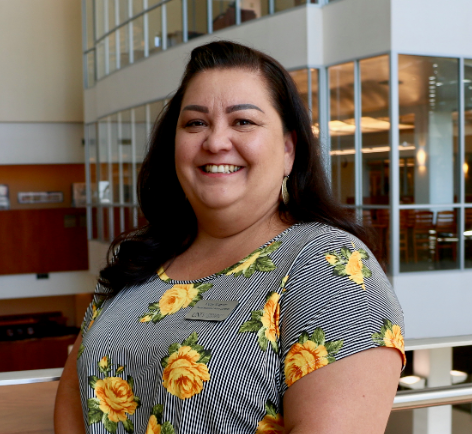Authors & Bios | Special Report: Nuestra Comunidad: Themes and Shared Experiences in a Latinx Librarian Cohort
About the Cohort
Creating community and support is important for new-hire librarians of color in order to adjust to a new environment and be set up for success. Forming a positive support network also helps to combat isolationism and provide a sounding board for questioning microaggressions.
As an informal cohort of three Latinx librarians, we’ve created a safe space supported by our shared backgrounds and commonalities. One where we can seek each other’s guidance, insight and solidarity in the tenure-track process and as new academic librarians. Two of the librarians were hired and started on the same day, forming an informal new-hire cohort. All three librarians are on the tenure-track and are part of a larger tenure-track cohort for the same year they will be up for tenure. All three librarians are new to academia.
Aidy Weeks is a native-born Puerto Rican or Puertorriqueña who also identifies as Borinqueña, which is an older adjacent term to “Puerto Rican” that is tied to the original name of the island and the indigenous population that inhabited it. It is a term of island pride while recognizing the colonialist roots that have shaped the island we see today. She speaks English, Spanish and Puerto Rican Spanglish con mucho orgullo. Aidy was born on the northeastern portion of the island in Fajardo, Puerto Rico that has a mixture of racial identities. Her mother is Afro-Puerto Rican with her grandmother’s familial roots connected to Loiza, Puerto Rico, one of the oldest communities of formerly enslaved Africans on the island. Her father’s side of the family has their roots more closely tied to white Spanish European. Aidy identifies as mixed race. She, her mother and siblings do not share the same skin color and as a white passing mixed race person Aidy recognizes her privileges, but also sees it as a source of personal conflict. She also comes from a low-income single-parent household. Her mother was and still is an amazing, strong-willed and hardworking role model, who raised three girls and sacrificed her own dreams to finish college. Aidy’s lived experience as a Latina, who relocated from the commonwealth in her youth and learned English as a second language, lived in poverty, and endured generational single-parenthood have all informed her identities.
Ruby Nugent is a fourth-generation Mexican-American, first generation college student who grew up in the Los Angeles area of Southern California. She spent much of her young life split between her father’s Mexican-American extended family household and her mother’s White, more traditional closely knit family nucleus. Because of this, Ruby was afforded the experience of an upbringing filled with weekends watching and listening to her Tata dance and sing in Spanish as he cooked in the kitchen and weekdays being bussed into a neighborhood outside her barrio to attend school with children who would eventually grow up to become doctors and lawyers. Never having learned Spanish, Ruby continuously felt she had to explain her “whiteness” to her childhood friends and defend her “brownness” to her more affluent, privileged classmates. As a result, she heavily identifies with living the Chicano/a experience - a culture rich in music, food, dress, lingo, and distinctly– Southern Californian. Like the pachucos and pachucas that came before her, she embraced the melding of two cultures - her Mexican heritage and the American experience – as a deliberate act of defiance against the expectations of acculturation and assimilation by society into her own identity that is neither one nor the other. Ruby still lives in a kind of “borderland,” practicing cultural humility to learn and grow, taking a more deliberate role in how she presents herself as a woman and academic professional, and entirely Chicana. Órale.
Mayra Corn (she/her/hers/ella) is a first-generation Mexican-American daughter of immigrants from Mexico. Mayra is a darker-complexion Latinx, whose physicality demonstrates her mestizo-mixed indiginous roots from the native Tarahumara tribe from Northern Mexico. She was raised in a single-income, blue-collar family of six. Her family consisted of her father who was a construction worker, her mother who was a homemaker, and three older siblings. The household was bilingual; to this day, she admits she cannot decipher what her first language was but rather grew up learning English and Spanish simultaneously. Notably, there was a distinction of language experience in her household where English was used in the “outside” world and Spanish within the “inside,” protected family unit. Mayra’s lived experiences as a queer Latinx individual have been shaped by dispositions similar to this one. She found herself split between two cultures, vacillating at the crossroads of cultural assimilation and acculturation. Mayra notes: “While I have been a bicultural social chameleon of sorts, as a mujer de color in LIS, I actively work to syncretize my language, my work ethic, y mis dos culturas.”



